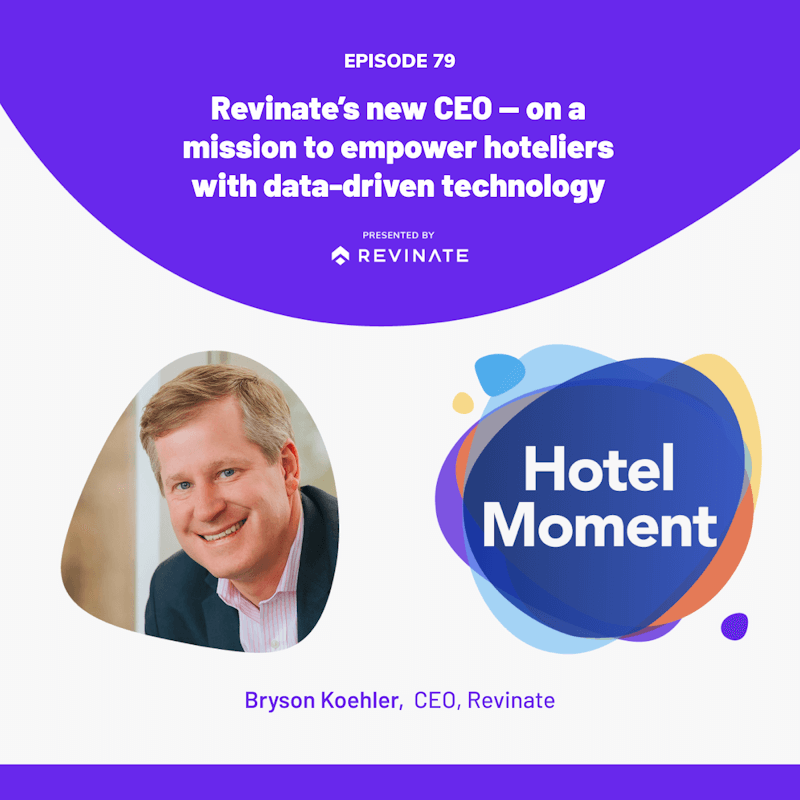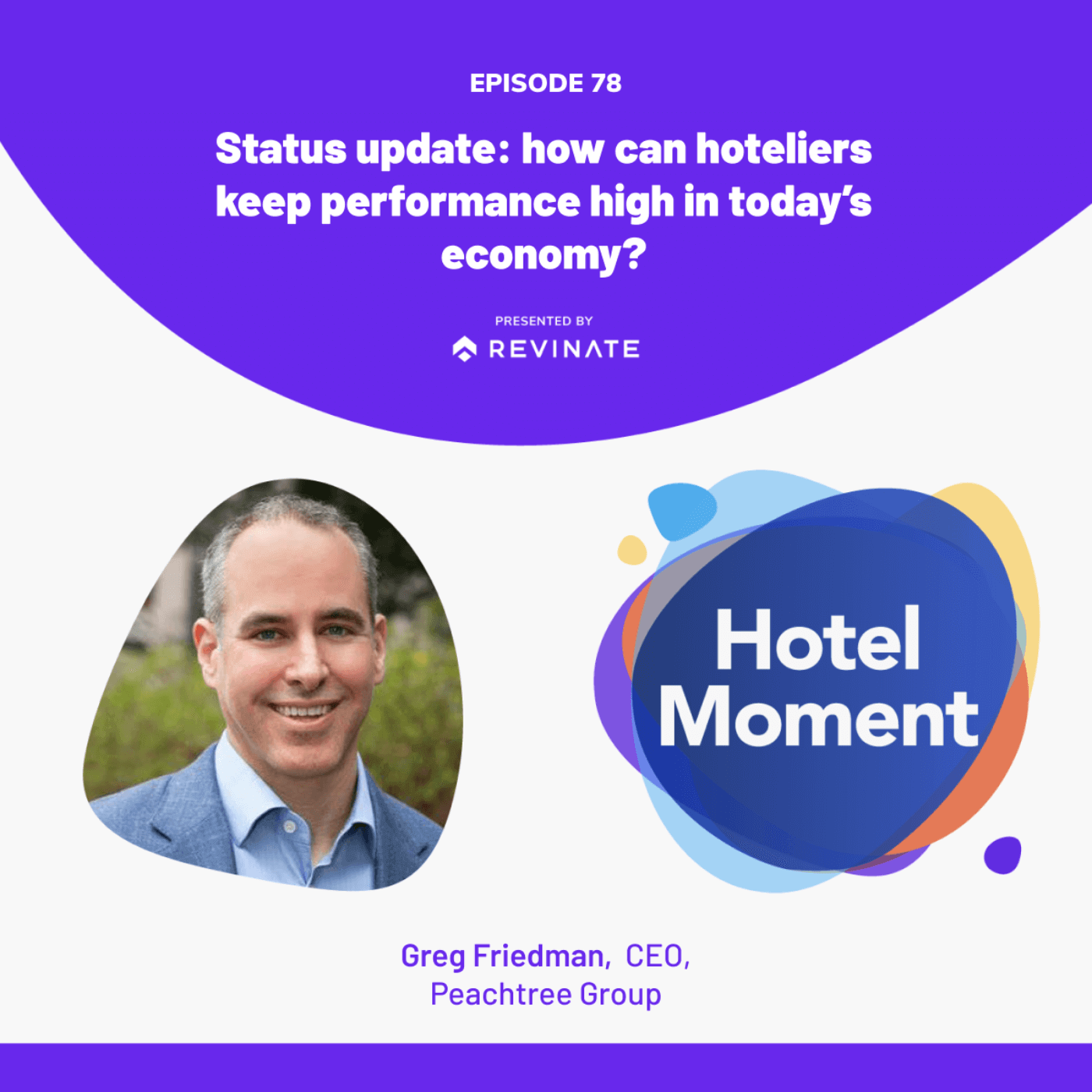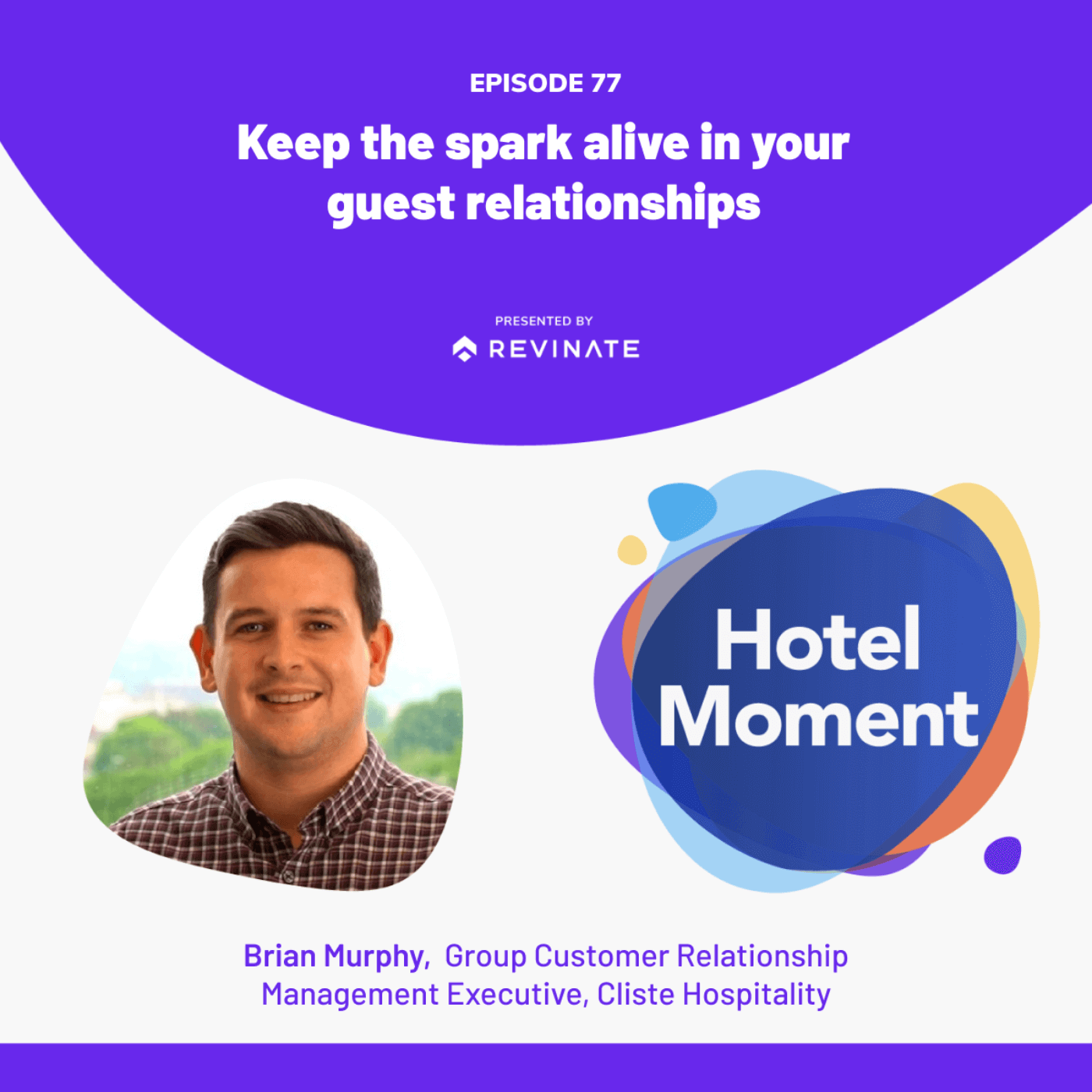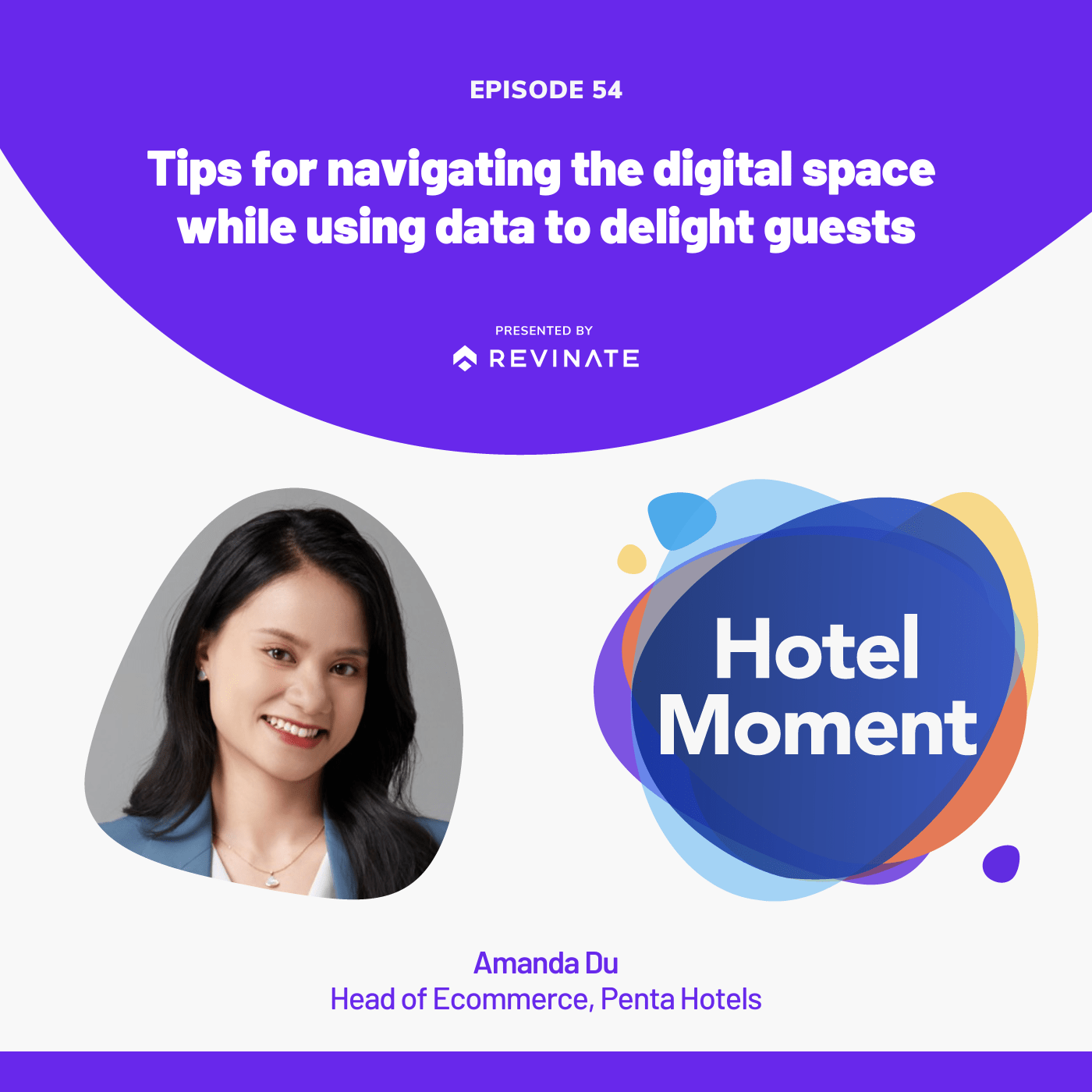

The Hotel Moment podcast — episode 54
Tips for navigating the digital space while using data to delight guests
In this week’s episode of the Hotel Moment podcast, Karen Stephens, Revinate’s CRO, and Amanda Du Jing, Head of Ecommerce at Penta Hotels, talk about enhancing the digital guest journey to understand guests on a deeper level. They discuss how guest data plays a pivotal role in this process and also dispel common misconceptions that can prevent hoteliers from exploring technology.
Tune in for a fresh perspective on how data and technology enable hoteliers to exceed guest expectations.

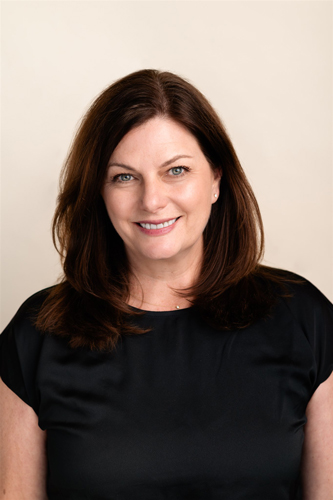
Meet your host
Karen Stephens is Revinate’s Chief Revenue Officer and runs the sales, marketing, and customer success teams. She has more than 20 years of experience in the industry alone.
On the Hotel Moment podcast, Karen speaks with leaders to draw out their experiences and insights. She is also a Francophile and Prof K — a coach, a mentor, a guide to the people who work with her.
Now Playing
Transcript
Karen Stephens: Hello everyone and welcome to the Hotel Moment podcast. I am your host, Karen Stephens, the Chief Revenue Officer of Revinate, and today I am delighted to be joined by Amanda Du, who is the Head of Ecommerce at Penta Hotels. Welcome, Amanda.
Amanda Du Jing: Hi Karen. Thank you so much for having me today.
Karen Stephens: Oh, it’s a pleasure.
You know, we’ve done a lot of these podcasts over the last, call it 8 or 9 months, and you’re only the second woman that I’ve had on the show. So I’m very excited. I love all the dudes. I’m happy about the dudes, but it sure is nice to have a powerhouse like yourself join us today. So you’ve got a lot of cool experience and I can’t wait to dive into that.
But before we do that, I wanted to start with some questions that we ask all of our guests just to get us warmed up.
Amanda Du Jing: Cool.
Karen Stephens: So if you’ll indulge me. Yeah, I’ll go with question number 1. So first question, when did you first start working in the industry and do you remember your first day on the job?
Amanda Du Jing: I started working in the industry I think 10 years ago, and it was never my plan. Because not like other hotels, I never started in tourism management or hospitality. I started English and accounting as a bachelor’s degree. So all of my uni classmates, they went either to the banks or big firms, and I was kind of the only one who ended up in the hotel and very happy about my decision until today. And my first job was the social media executive during that time when social media just start emerging and nobody really knew how it works and nobody holds a master’s degree on digital marketing, for example.
And I still remember my first day on the job, I was so amazed by how big the back end of the hotel is because as a customer I always saw how big, how it is front, front house of the hotel.
But on the first day I was like, I almost got lost. I was like, “oh, wow. There’s so much going on behind the scenes.”
Karen Stephens: Yeah, that’s great. Can I ask you, where’d you go to university?
Amanda Du Jing: I was in, I was in China.
Karen Stephens: Oh wow. Okay, cool. Yeah, that is very cool. So you learned English as a second language in China. Wow, that’s great.
And now, wow, that’s huge. Amazing. Okay, so second question. What is the most uplifting moment so far in your career?
Amanda Du Jing: Well, it’s a, it’s a tough one. And I think there were so many but I would, if I have to pick one, I would say that when I first had my own team when I was working in Malaysia for, for IHG Group. So I built the whole team from the scratch and also introduced the digital marketing expertise concept to the, to the region, to Southeast Asia region, and hired all of the non-hotel layer digital gigs at that time in the team.
And I think I remember that when we had our first meeting together, that was a moment I feel, “Oh wow. I’ve already achieved something and I, and I believe with the team and there will be more to come.” And it of course turned out to be a very successful story. So I still remember the day when I have everybody sitting there and we had, when we had the first team meeting.
Karen Stephens: Oh, isn’t that cool?
That’s a great, that’s a great moment to look back on. Okay, this 1, number 3 is a little more personal. So what is the most striking experience you’ve had so far in terms of a personal holiday or stay or food experience, some trip or travel that has been the most striking so far?
Amanda Du Jing: I have to say it’s my trip to India, New Delhi.
It was such a striking experience that I, I still can see those colors vividly when, when I think about it and all those spices, right? I like spicy food. But all those different types of spices, the Indian food compose, it’s, it’s really amazing. But I think the most important thing, or most thing that I remember, is that the people who working there, who work in the hospitality industry there. You could feel that they are so proud and so passionate about their job and about what they do, and of course if it’s coming from their heart.
So the service level, it’s really different, and you feel very warmly welcome there.
Karen Stephens: Oh, that’s really cool. I’ve never been to India and I would love to go. I certainly have a lot of colleagues who are Indian and it’s such a beautiful, colorful culture. Like you said, it’s, it’s great. Okay, fourth one. Have you met any celebrities while you’ve been in the trenches?
Amanda Du Jing: Surprisingly none.
Karen Stephens: None?
Amanda Du Jing: Yes!
Karen Stephens: All right!
Amanda Du Jing: Usually probably the first one!
Karen Stephens: Yeah! Usually someone’s got some story. All right. Well, and I know you’ve been working probably, it’s been a while since you’ve been in the hotel itself. You…
Amanda Du Jing: Yeah. And I guess because I was most of the time in the office, not like colleagues working in the operations, so I’m more in the back of the hotel.
Yeah. But I, I met a lot of normal people I think, who inspired me. Yeah. And I, I always very surprised to hear those stories. I would never guess when I, when I first met them. So yeah, not really celebrities, but many fantastic individuals I would say.
Karen Stephens: Okay. Well that, that is a great dovetail into the fifth question, which is, who are the women at work you have been most inspired by?
Amanda Du Jing: Well, there I was very lucky. Well, when I first moved to Singapore from China and I had a group of women when I was working with the Radisson Hotel Group. And in our commercial team, we had a very international team, with nationalities like me from China, Canada, Turkey, and Finland, and of course Singaporeans, local people there.
So for all of those international team members within the commercial team, we arrived in Singapore, more or less similar time, and we supported each other tremendously and, and developed a great friendship until today. So I think we are role models to ourselves, to each other, and we inspire each other a lot.
So we still keep in touch, keep each other updated on our career advances and, and just life in general.
Karen Stephens: Yeah. That is so cool. You know, we have an office in Singapore and I, I just love Singapore so much cuz it is such a melting pot. It’s so diverse in terms of people coming from all over the world, and all different backgrounds and, and I think you’re right that, that makes, that makes for really awesome learnings. And you know, you can just learn so much from the people coming from all those different places. So, very cool. All right, well thank you for that. This is awesome. See, I’ve already learned something. So, why don’t we start by, would you tell me a little bit about who Penta Hotels are? What does the portfolio look like?
What do you specialize in? All of that good stuff.
Amanda Du Jing: Yeah. Penta, Penta, we have in across Europe, 20 plus hotels and Penta as a brand, it’s all about social interactions, general service, and chilled vibes. So we value the communication, community, and comfort. We offer the lively neighborhood hotels in those appealing locations in Europe, and at heart of each Panta hotel is our Penta lounge, which is a concept we pioneered years ago where we offer a sweet spot for our customers between our vibrant and laid-back lifestyle. So for, for the customers to relax play, and recharge.
Karen Stephens: Oh, that’s really cool. So, you know, you mentioned a little bit about, you know, the guest experience at Penta Hotels, and I have a quote from you actually that reads, “with the supportive technology, we still need to use the customer data in emotionally intelligent ways. Having a customer-centric mindset is key and success.” So it sounds like you create those chilled vibes, that’s what’s happening on the surface, but what’s going on behind the scenes and can you gimme a little more color on that quote,?
Amanda Du Jing: Yeah, of course. We talk a lot about digital guest journey technology, how we could revolutionize the way we operate hotels, but I think the way it’s, it’s really not the core. It’s, it’s not how we revolutionize the way we operate the hotel, but it’s really how we are using technology in a more emotionally intelligent ways to understand the customer best. So for us, I think to, to get the customer data right and better serve, serve our guests is the key.
The analysis of customer-related data, which is captured through the whole digital, through the whole journey before they even interact with the hotel.
Karen Stephens: Right.
Amanda Du Jing: So right. At the same time, we also wanna understand to how we optimize those customer-related processes and to both from the customer side and from the employee side.
Most of the time we forget how the employee, how the front desk operates, and we have this great big idea on how we want to deliver that customer success. But I think it’s very important for us to really also look at, from the employee side, how, whether it is feasible, how we make it happen. And of course, in addition to our own data, we, we also look at what are the customer trends and, and research data in the customer behavior to make sure that we make the customer-centric decisions, especially after Covid, right?
The, the whole need is, is different. So offering a seamless travel experience is not an “add-on” service anymore. It’s, it’s, it’s must-have. So from this, I think, you know, to, to really understand what customer wants, what they need is essential for us to, to succeed.
Karen Stephens: Yeah. It’s kind of where vision meets operations, right?
Amanda Du Jing: I like that.
Karen Stephens: It’s like, yeah, that’s a great idea. How do we make that actually work? You know? So, you know, it was awesome understanding a little bit more about your background and how you started in the digital space, and you’ve had so much influence in that space. I wanna dive into your ABCD framework. So, I’ve heard you speak about this, but our listeners might not know about it.
Can you tell us what that is and, and how you use that in personalizing the guest journey?
Amanda Du Jing: So the ABCD framework is more on how we did the whole digital transformation in the Penta Hotels. So okay. ABCD. The a is more on the analysis part. Analytics dimension, which includes what I just explain earlier the analysis of customer-related data captured, captured through the whole journey.
And the b is a business part. So to understand what is important for, for the, for the hotels itself and. The whole business, the changes of the business conditions to improve the customer experience. So the internal business conditions are related to changes in management decisions. For example organization’s, missions, for example.
And c is the most important part, and which I, I always put it as a core is our customers. Yeah. So the core and the entire customer interaction journey.
And the d is the digital, one of the most important enablers, I would say, the technology part to make all of those transformations happen.
Karen Stephens: Wow. That’s so cool. That’s so cool. So now we’re gonna shift gears a little bit because I, I mentioned, you know, that I think you were really at the forefront, well, you, you kind of said it yourself as well, when you first got into the digital space, that was really very new. It was kind of the, it was just starting, which was not that long ago, but it’s just starting to evolve. So I noticed that you’re also really involved in Web3 and the metaverse and all these things. So, can you just, there’s a lot, probably a lot of listeners out there like me, I’ve heard a little bit about this, maybe don’t know as much as we should. Can you just kind of give us an overview of what the, what your interest is there and how you think it applies to hospitality or how it might in the future?
Amanda Du Jing: Yeah, so I think well let, let’s get some concepts straight maybe. And when we, yeah, when we jump into that, Web3 is, is, is the name that is given to what some people call the next phase of the, of the internet. Right? Okay. Which runs on the blockchain technology and is decentralized. So if we say Web1 was all about reading information and we are now in kind of a Web2 and Web3 transition.
Web2 was about co-creation, especially those user-generated content. We can publish all those on social media. And then Web3 is about the ownership and all of those is, is based on the blockchain and metaverse. And Metaverse is more of the, the internet where it creates a new way we experience the digital world.
I would say imagine the whole website and you just lift it up as a 3D and you explore it around you. So, I, I, say it’s, it’s an interconnected digital reality where we become advertised to communicate experience, work, play, and do things we never, which will never possible before. And what, what does it relate to, to the hotel, to the travel?
And, and I think we, we talk a lot, you know what, what happens before they even come to the hotel? Before they even start traveling? Right? I think that Web3 area, or the metaverse part would enhance, or its extension of this whole travel experience. So where the customers can really like go into your hotel, experience, the hotel, and to pick the room, they want to make sure they, they know what they, they are buying for I would say, and to, to, to really have a good, good first impression and a, and expect, expectations before they, they come to experience the hotel.
But, and I, I, I know a lot of people also say like, would, would people then just stay at home with their goggles and not traveling? No.
Karen Stephens: Yeah, I agree with you.
Amanda Du Jing: After Covid, we also say, “okay, should, would home office replace human interaction, in-person interaction?” No, it will not. But, it, it just adds another dimension to the whole travel experience and to our own experience. I think will, will add definitely more benefits to, to hotels in the future. To customers for sure.
Karen Stephens: Absolutely, and I agree with you 100%. First of all, it’s really exciting to think about that kind of technology where you could actually walk into a hotel and understand how everything is laid out and get an idea of things before you go. But I agree with you 100% that people shouldn’t be nervous that all of a sudden people will do that instead of traveling because we all need to get, get moving again. So that, that’s, that’s really interesting. And I know, so we’re recording this right before ITB, it’ll probably come out after ITB, but you’re based in Munich, in Germany, and we’ve got ITB coming up in Berlin next week, I believe.
Is it next week?
Amanda Du Jing: Yeah. Yes, next week.
Karen Stephens: Exciting because it has like, it’s been, you know, gone for 3 years. So can you give us some highlights of what you’re looking forward to? We’ll check back in with you afterward, but I know you’ve got some, a speaking panel, and some other things, but what are you looking to forward to mostly about ITB and coming back this year?
Amanda Du Jing: I think definitely is the interaction with the, with, with different people. To see, “okay, what are the, what are the new things out there?” And I’m, I’m also speaking at 1 panel about loyalty in travel industry and a keynote on how hotels enter Web3 era.
Karen Stephens: Oh!
Amanda Du Jing: So by looking at the content and also other different tracks, I’m very excited to see there are a lot of technology-focused future focus topics are going to be discussed there, and I think that’s the most exciting part for me.
Karen Stephens: Well, that’s great. Well, again, this will probably come out after ITB but if you’re listening and you wanna learn more about Web3 and the metaverse, then find, find them out from ITB to get more information.
Yeah. So one last thing I wanted to talk to you about was a little bit more, and this is kind of all tied together, but about AI and hotel tech. So artificial intelligence, and do you think that hoteliers are doing a good job of leveraging that technology today? How do you see it? How do you see it evolving?
Amanda Du Jing: I think from the marketing perspective, we, we started using it quite, quite early space already, or quite early stage already. Like when we, when we are looking at all those customer data, how we personalize their, their, their, their offer, and also like how we do those targeted advertisements. It was all powered by AI.
Didn’t really talk about it in the past and, and probably everybody come across the ChatGPT now and it’s suddenly a huge topic again, this year and, and. and I, and I think for the hotel side, there’s some misconceptions from our side that’s saying, “well, that’s the biggest fear, right?” Every time when we see a new technology, we always kind of got scared. Like, “would that replace the hotel staff? Like, would, would that replace all the people working in the hotel with all those robots delivering the room?” Or whether those AI tools can only be run by those highly specialized data scientists, for example, scientists. Which I think shouldn’t be, see it that way.
And, and I think AI is, is, is like technology is not everything, right? It’s just an enabler. And we should be better utilizing it and not think that we have to have a huge amount of money to invest to, to it. And as I mentioned, it can start very small to better understand your customer first, and, and the whole journey, the customer journey.
Make sure that’s smooth and to help their tools can help you optimize your, your, like revenue forecast, demand, and better plan your, your manpower and your labor force in the hotel. And, and we are also, we were also piloting some tools that could predict food wastage, for example. So there are many ways to utilize this technology,
and I think hotels now start looking at it from a, a more holistic angle, like different angles. And not only from the marketing side, but, but also from revenue side, and marketing and revenue, how we work together to better utilize AI, right? They have great tools to do forecasting. We have great tool to target customers and how we combine those to give, to provide customers the, the, the offer that they are looking for.
And also from operational side, I think there’s a huge potential where they can really make use of the technology and at the same time to be more efficient. So not only boost the guest satisfaction, but also the employees at work.
Karen Stephens: Yeah. Yeah. Kind of eliminate some of the monotony or some of the, the jobs that, the, the part of the jobs that are not as, as engaging as, as others.
I’s a good way to think about it. Yeah. So what, what advice would you give to maybe a hotel out there who doesn’t have, isn’t a part of a group that’s advanced thinking like this, and where would you suggest that somebody go just to start to educate themselves on these kinds of things?
I don’t know if there’s anything that comes to mind?
Amanda Du Jing: I think ITB is a great opportunity.
Karen Stephens: Yeah, that’s right. Hopefully, you were there. Yeah. Yes. Go to shows. Go to trade shows.
Amanda Du Jing: Exactly. Go to those conferences. There are so many conferences after Covid and so many that year that I, I couldn’t even attend most of them. And, I think really, to look for that information online to see what other topics you are interested in. There are those conferences, just focusing on customer journey. There’s conferences just focusing on hotel technology. I think, to, to get yourself out there. Be open. Yeah, I think that’s the most important attitude.
Just, you know, to, to get to know what you don’t know before. So that will be my advice.
Karen Stephens: Yeah. That is fantastic advice. Well, thank you so much, Amanda. This has been an amazing conversation. So just so our listeners know, where can they find more information on Penta Hotels?
Amanda Du Jing: So our URL is at pentahotels.com. Also LinkedIn and Instagram.
Karen Stephens: Yes, and Instagram. Okay. Awesome. Thanks so much for the conversation today, Amanda. I really appreciate it. Thank you.
Amanda Du Jing: Thank you so much.
Karen Stephens: Take care.
Media
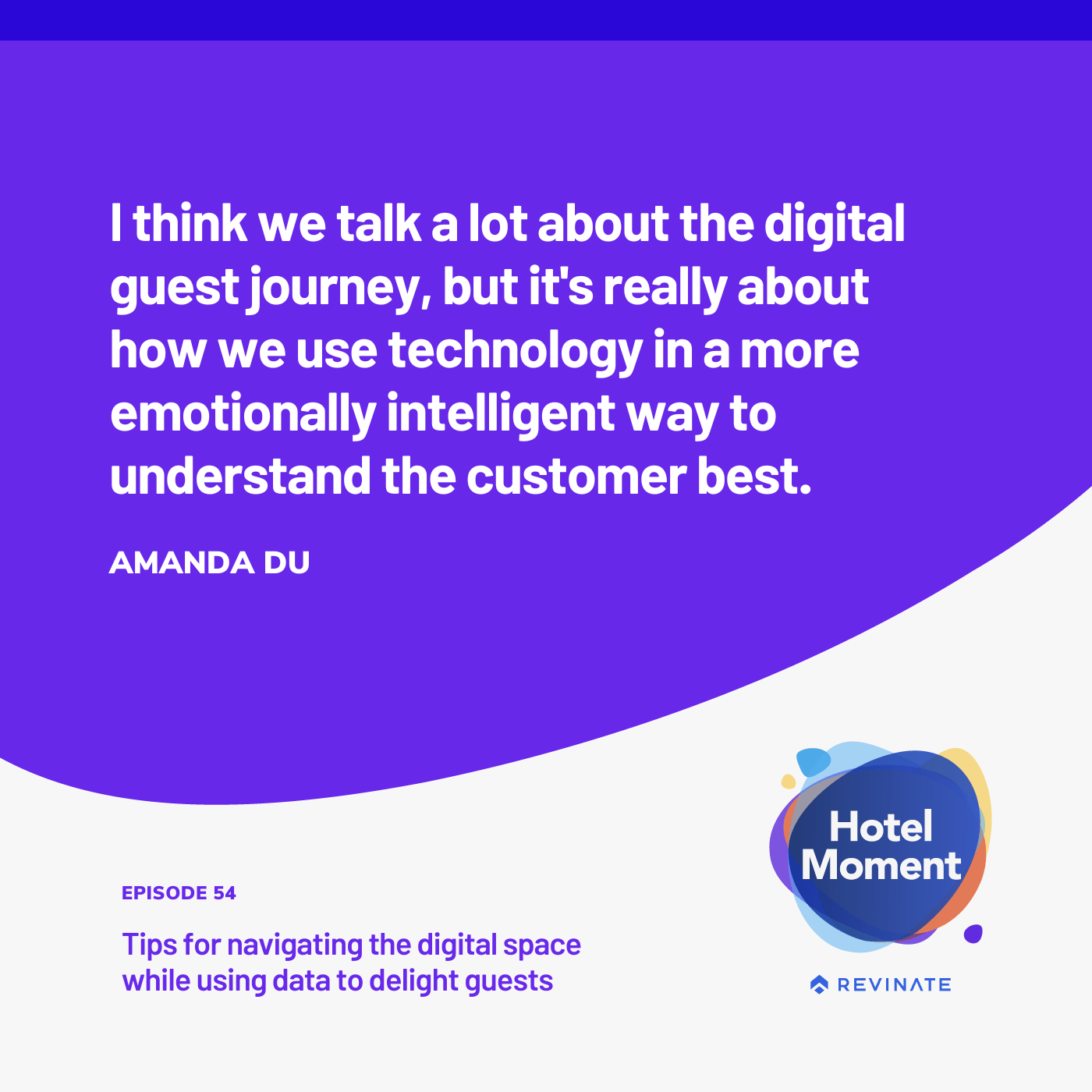
The digital guest journey
Taking a holistic view of technology
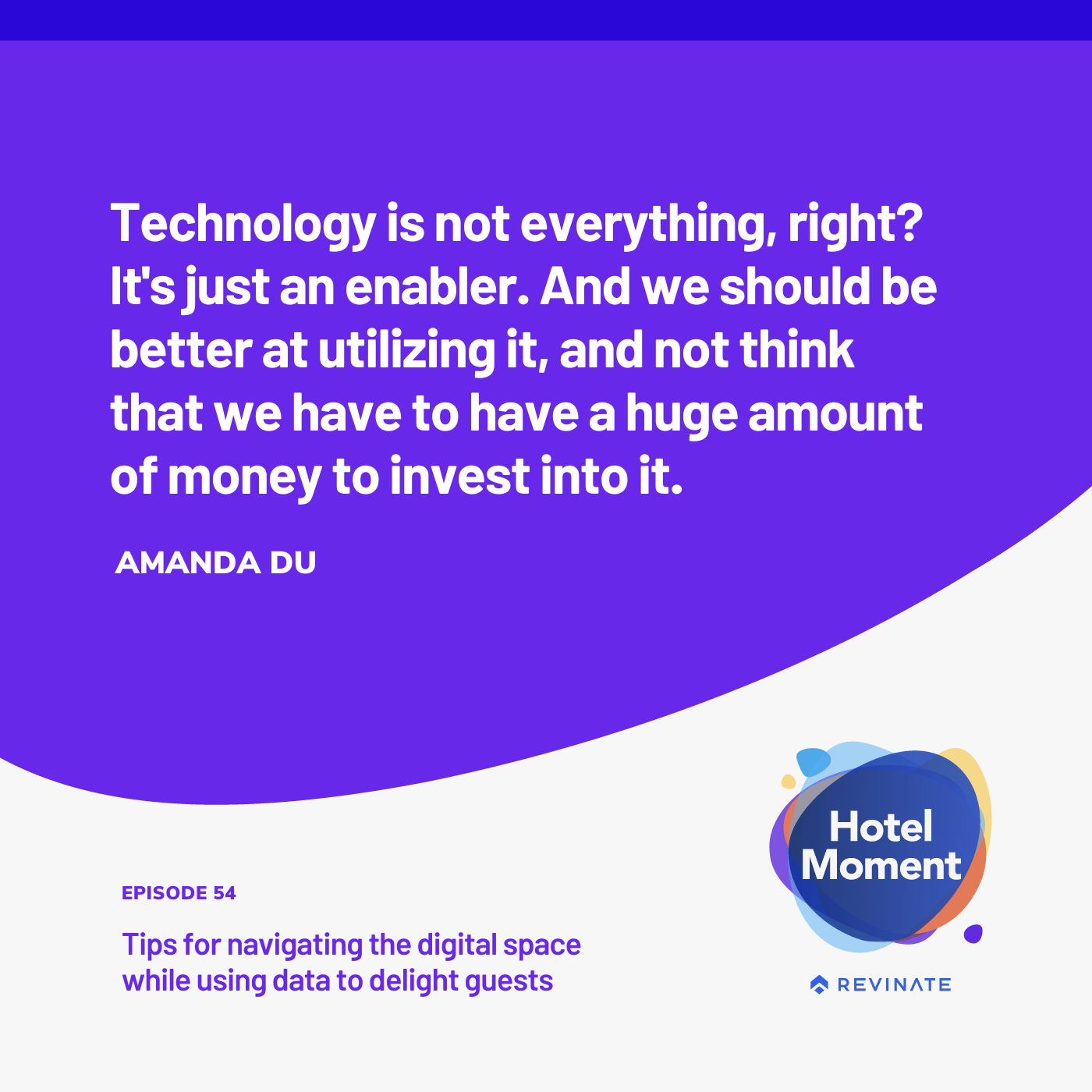
Technology is an enabler
Misconceptions about AI and hotel technology
Related episodes
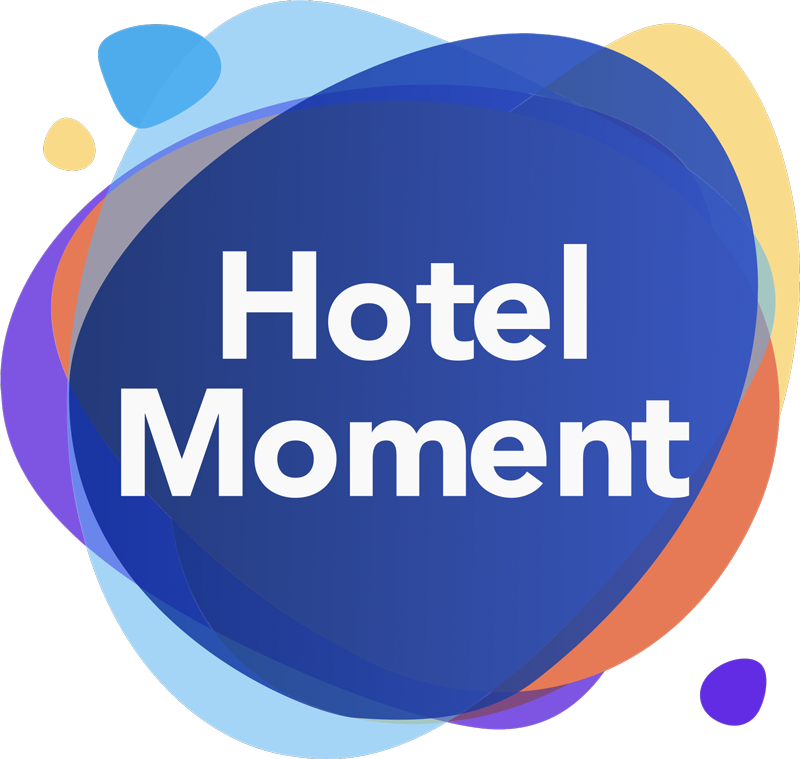

Be the first to know when a new episode drops
This site is protected by reCAPTCHA and the Google Privacy Policy and Terms of Service apply. *Required fields.




